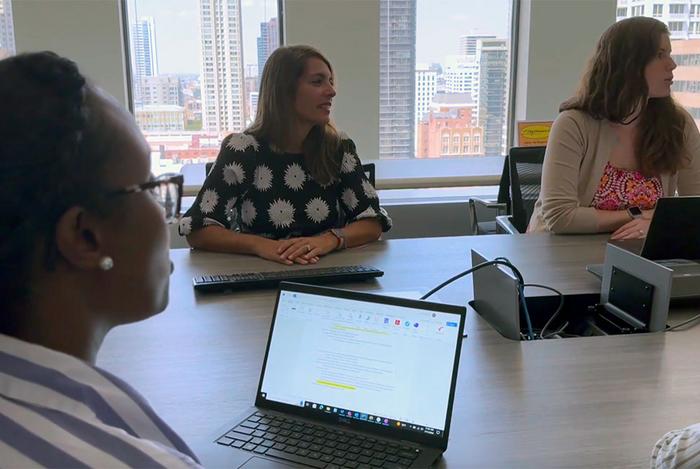CHICAGO — If it takes a pediatrician less than one minute per visit to talk to parents about how to securely store their firearms and offer a free cable lock, why do only 2% of doctors report routinely doing so?
- Large study included 47,307 well-child visits at 30 clinics in Michigan and Colorado
- Almost 50% of clinicians receiving a prompt plus added support delivered a secure firearm storage program during well visits versus just 22% of doctors receiving prompt only
- Firearm-related injuries are the leading cause of death for young people in the U.S.
- ‘We can save lives’ with a brief program to support parents in secure storage
CHICAGO — If it takes a pediatrician less than one minute per visit to talk to parents about how to securely store their firearms and offer a free cable lock, why do only 2% of doctors report routinely doing so?
Turns out, they might just need a ‘nudge’ and a little extra support.
“We know we can save lives and this study offers insights on how to scale this approach nationally,” said principal investigator Rinad Beidas, chair of the department of medical social sciences and the Ralph Seal Paffenbarger professor of medical social sciences at Northwestern University Feinberg School of Medicine. “This is a call to action.”
The study included 47,307 well-child visits of children ages 5 to 17 at 30 clinics in Michigan and Colorado. In the Nudge group, 22% of pediatricians delivered the S.A.F.E. Firearm program whereas 49% of pediatricians in the Nudge+ group delivered the program — a significant difference.
“Our clinical staff was very supportive of the program, especially when additional guidance was available,” said Brian Ahmedani, director of Henry Ford Health’s Center for Health Policy & Health Services Research. “Conversations around firearms can be uncomfortable. The support staff helped navigate how and when to introduce the topic and at what point to offer the cable lock.”
The findings will be published Sept. 3 in JAMA Pediatrics.
On average, each “Nudge+” program required only 8.7 hours of additional support per clinic over the year.
“We would have expected that we’d need far more resources for that kind of effect, but with less than an hour per month per clinic, it’s something that could be done in the real world without a lot of resources,” Beidas said.
One in three U.S. homes have a firearm
About one-third of U.S. children live in homes with firearms, and of these households, 43% contain at least one unlocked firearm. Previous research has shown individuals who have a conversation with their doctor about the importance of secure storage combined with the offer of a free cable lock were more likely to report improving their safe gun-storage practice.
Securely storing guns can reduce firearm-related injuries, which is the leading cause of death for young people in the U.S. In June, U.S. Surgeon General Vivek H. Murthy declared America’s firearm violence a public health crisis. In his advisory, Murthy calls out the need to conduct more implementation research to improve effectiveness of prevention strategies.
“Our study is the largest of such implementation trials, and I’m thrilled Dr. Murthy is spotlighting this type of research,” said Beidas, an internationally recognized leader in the field of implementation science. Her research focuses on designing, implementing and evaluating strategies to make it easier for clinicians, leaders and organizations to improve the quality and equity of health care.
Why don’t more pediatricians counsel on secure firearm storage?
There are numerous reasons why so few pediatricians discuss secure firearm storage with parents, Beidas said. Some are time-related or how comfortable the doctors are talking about it, whether it’s built into the workflow and if it is supported by leadership. But it’s also a divisive topic, and doctors and nurses find people are not comfortable sharing if they have a gun at home, Beidas said.
“So, our goal is to have pediatricians counsel everyone,” she said, explaining the program is for all kids — not just those at particular risk, such as having depression or being exposed to domestic violence. “Our goal is to help people be as safe as they can as often as they can, and our study demonstrates that this can be done in a non-political manner.”
Next up: Expanding nationally
This study was conducted in only two states, but Beidas said her goal is to expand the effort nationally. First, she’d like to empirically show this type of national effort reduces firearm injury and mortality in young people. Second, she plans to expand this work beyond pediatric primary care to other health care settings.
“Our marker of effectiveness for this study was whether the clinicians did the program, but that’s not the final step of the cascade,” Beidas said. “We’ll have future papers that explore if the parents actually changed their firearm storage behavior.”
Journal
JAMA Pediatrics
Article Publication Date
3-Sep-2024





